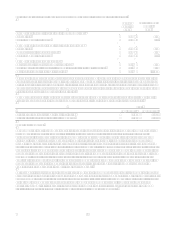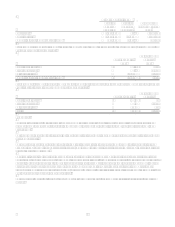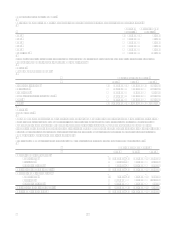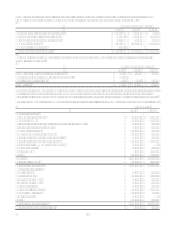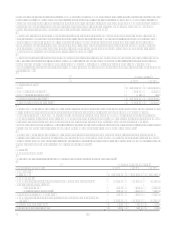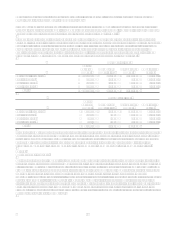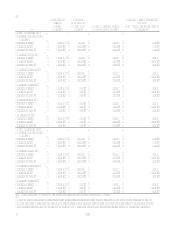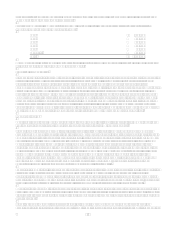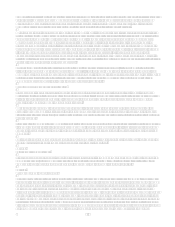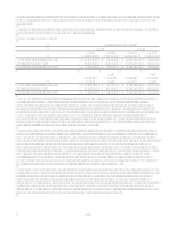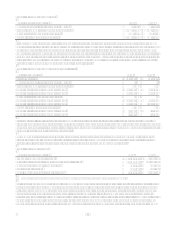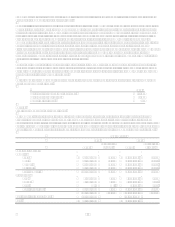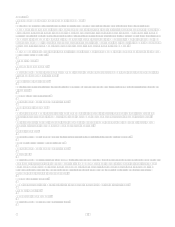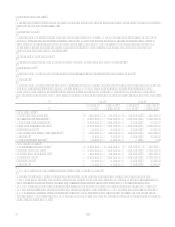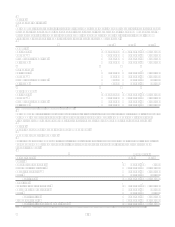Capital One 2006 Annual Report Download - page 121
Download and view the complete annual report
Please find page 121 of the 2006 Capital One annual report below. You can navigate through the pages in the report by either clicking on the pages listed below, or by using the keyword search tool below to find specific information within the annual report.
103
index. Total rent expenses amounted to approximately $60.0 million, $68.1 million, and $38.5 million for the years ended
December 31, 2006, 2005 and 2004, respectively.
Future minimum rental commitments as of December 31, 2006, for all non-cancelable operating leases with initial or
remaining terms of one year or more are as follows:
2007 $ 141,116
2008 139,338
2009 122,541
2010 103,082
2011 87,447
Thereafter 528,048
Total $ 1,121,572
Minimum sublease rental income of $24.0 million, due in future years under noncancelable leases, has not been included in
the table above as a reduction to minimum lease payments.
Securitization Guarantees
In connection with certain installment loan securitization transactions, the transferee (off-balance sheet special purpose entity
receiving the installment loans) entered into interest rate hedge agreements (the swaps) with a counterparty to reduce
interest rate risk associated with the transactions. In connection with the swaps, the Corporation entered into letter
agreements guaranteeing the performance of the transferee under the swaps. If at anytime the Class A invested amount equals
zero and the notional amount of the swap is greater than zero resulting in an Early Termination Date (as defined in the
securitization transactions Master Agreement), then (a) to the extent that, in connection with the occurrence of such Early
Termination Date, the transferee is obligated to make any payments to the counterparty pursuant to the Master Agreement,
the Corporation shall reimburse the transferee for the full amount of such payment and (b) to the extent that, in connection
with the occurrence of an Early Termination Date, the transferee is entitled to receive any payment from the counterparty
pursuant to the Master Agreement, the transferee will pay to the Corporation the amount of such payment. At December 31,
2006, the maximum exposure to the Corporation under the letter agreements was approximately $17.0 million.
Industry Litigation
Over the past several years, MasterCard International and Visa U.S.A., Inc., as well as several of their member banks, have
been involved in several different lawsuits challenging various practices of MasterCard and Visa.
In 1998, the United States Department of Justice filed an antitrust lawsuit against the MasterCard and Visa membership
associations composed of financial institutions that issue MasterCard or Visa credit or debit cards (associations), alleging,
among other things, that the associations had violated antitrust law and engaged in unfair practices by not allowing member
banks to issue cards from competing brands, such as American Express and Discover Financial Services. In 2001, a New
York district court entered judgment in favor of the Department of Justice and ordered the associations to repeal these
policies. The United States Court of Appeals for the Second Circuit affirmed the district court and, on October 4, 2004, the
United States Supreme Court denied certiorari in the case. In November 2004, American Express filed an antitrust lawsuit
(the Amex lawsuit) against MasterCard and Visa and several member banks alleging, among other things, that the
defendants jointly and severally implemented and enforced illegal exclusionary agreements that prevented member banks
from issuing American Express cards. The complaint requests civil monetary damages, which could be trebled. The
Corporation, the Bank, and the Savings Bank are named defendants in this lawsuit.
Separately, a number of entities, each purporting to represent a class of retail merchants, have also filed antitrust lawsuits (the
Interchange lawsuits) against MasterCard and Visa and several member banks, including the Corporation and its
subsidiaries, alleging among other things, that the defendants conspired to fix the level of interchange fees. The complaints
request civil monetary damages, which could be trebled. In October 2005, the Interchange lawsuits were consolidated before
the United States District Court for the Eastern District of New York for certain purposes, including discovery.
We believe that we have meritorious defenses with respect to these cases and intend to defend these cases vigorously. At the
present time, management is not in a position to determine whether the resolution of these cases will have a material adverse
effect on either the consolidated financial position of the Corporation or the Corporations results of operations in any future
reporting period.
In addition, several merchants filed class action antitrust lawsuits, which were subsequently consolidated, against the
associations relating to certain debit card products. In April 2003, the associations agreed to settle the lawsuit in exchange for


